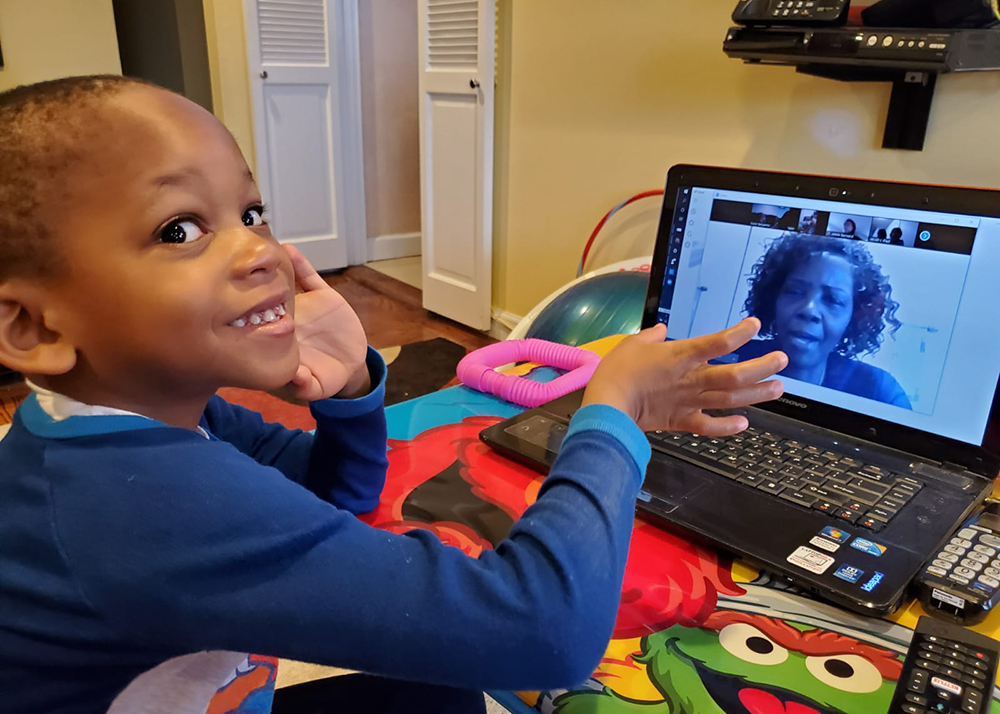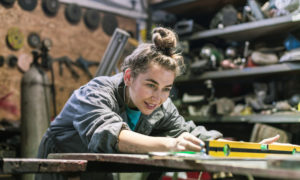
Michael Benjamin
Maxwell Benjamin is learning via Zoom while his school is closed and uses a tablet to communicate nonverbally.
NEW YORK — Maxwell Benjamin sits in front of a grilled cheese sandwich cut into bite-sized pieces.
His mother Susie Wong-Benjamin encourages him to take bites and chew because he prefers softer foods like spaghetti and mashed potatoes. She’s guided remotely by his speech therapist, who joins them through a Zoom meeting. This is a first for Maxwell, 4, who is used to being in a classroom.
 Maxwell has autism and is nonverbal. This is how his various therapy sessions look now that his school, These Our Treasures, must operate online. Despite a tech learning curve, changes to routine and being stuck inside, his father Michael Benjamin notices improvement.
Maxwell has autism and is nonverbal. This is how his various therapy sessions look now that his school, These Our Treasures, must operate online. Despite a tech learning curve, changes to routine and being stuck inside, his father Michael Benjamin notices improvement.
“He’s eating better at home. There’s no doubt about that,” he said.
At school, Maxwell was more engaged eating with his teachers than he was at home with his parents.
“But now we’re sort of all doing it together and he’s being responsive to Susie and me as well,” he said.
Since the city’s Department of Education shuttered schools two weeks ago to slow the spread of COVID-19, city charter schools and schools like These Our Treasures, a nonprofit agency that operates a special education preschool, have followed similar guidelines for distance learning. After a week’s respite for educators, parents and students to prepare, March 30 was the first day of the new normal.
Lessons for parents too
Benjamin says there’s a silver lining to parents being thrust into even more responsibility, facilitating lessons and therapies with their children at home. Maxwell has typically used a tablet to communicate nonverbally with his teachers at school. Now he’s spending more time using it to communicate with his parents.
“It’s something we’ve been wanting to do,” Benjamin said, “because we now know how to incorporate use of the device in his daily activity.”
Wong-Benjamin said it’ll take time for parents to effectively keep their children engaged and for all involved to get used to modern tools. Educators are working out the kinks of the new systems as they go.
“Sometimes they’re muting participants when they’re trying to unmute one, so we’ve got a lot of glitches along the way,” she said.
But regardless of tech issues, she sees her son engaging with his teachers through the computer.
“Luckily, he is listening to them,” Wong-Benjamin said. “Maxwell was able to see the image of himself eating and they were guiding and coaching me throughout and it turned out to be a successful session.”
Maxwell’s love of soft foods creates a need for the feeding sessions as his speech development hinges on eating solid foods too.
“The thought is that if he’s chewing better, he has better tongue movement and that should help him when it comes to forming words,” Benjamin said. “Once all that strength is there and then he’s confident, hopefully he’ll begin to speak.”
Disrupted routines

Rebecca Rodricks
Incorporating these methods into his daily activity is key, according to speech pathologist Rebecca Rodricks, who serves as clinical supervisor at These Our Treasures. She says consistency is crucial for young people learning from home, particularly for those with special needs. But now regularity built throughout the school year has been thrown off.
“There are some students who are trying to put on their backpack every day and they don’t understand their routines have been disrupted,” she said.
Falling into inconsistent behavior will result in less engaged and efficient home learning.
“What everybody needs to be working on is developing routines,” Rodricks said, “but that’s lacking in the school systems in general and it’s noticeably lacking in the special education preschool system.”
When it comes to developing routines for younger children with special needs, Rodricks says Susie Benjamin is uniquely prepared. She’s assisted in teaching and has participated in the school’s education programs in the past.
“We were able to replicate that even one week into this model by reminding her of the strategies that she had learned,” Rodricks said.
In addition to the school’s lessons and therapies, Wong-Benjamin incorporates physical activity in the routines she and her son are creating. Like any 4-year-old, Maxwell is a mover.
“He loves to run and jump and hop and be free on a playground,” she said.
Fortunately, the Benjamins’ home looks a lot like a playground with mats, sensory toys and a trampoline. Wong-Benjamin realizes not all parents can provide an environment conducive to such physical learning. Some of the items can be expensive and out of the reach of some family’s budgets.
Tech is particularly cost prohibitive and its availability is the biggest issue making remote learning difficult or impossible for some parents, according to Rodricks.
“There might be one parent’s cell phone and there are four kids. Trying to figure out those barriers, trying to figure out what’s fair has been a challenge from a school perspective,” she said.
Even though technology, space and sensory toys might be out of reach for some, all families can benefit from being as engaged and organized as they can. Maxwell’s parents are uniquely prepared, Rodricks said.
“They’re not just an outlier in their capacities. They’re an outlier in their experiences. They’re an outlier in their relationship with their therapists. They’re an outlier in the technology that they have access to,” she said.
Education nonprofit works with all ages
Access to technology is a barrier for entry for students around the world. Some companies, like Evoluer Solutions, are ahead of the game in providing successful online learning environments to students with special needs.
Evoluer Solutions is a global education nonprofit aiming to make education practices more inclusive for students with special needs from early childhood to adulthood. The shift to remote learning was pretty seamless for them.

Evoluer Solutions
Shaloo Sharma
“We just shifted gears automatically, so nothing stopped,” said Shaloo Sharma, founder and director. “We took a break for three days and that’s about it. We have gone 100% online; all our students are equipped for handling the Zoom platform.”
As many parents are also conducting work at home via Zoom, Sharma notices her students are empowered and inspired using the same technology.
“I think it brings about a feeling of being included in what’s going on in the world,” she said.
In New York City, at the beginning of April, the Department of Education suspended the use of Zoom in public schools, citing privacy concerns. This doesn’t affect a nonprofit like Evoluer nor does it affect Maxwell Benjamin, whose school isn’t under the jurisdiction of the DOE.
Evoluer works with students on the autism spectrum as well as those with learning disabilities like ADHD who benefit from targeted education support.
“These are the students who have the maximum danger of falling through the cracks,” she said.
The support crafted through modern online tools is working, as her students last year all graduated with jobs and internships. As this new model proves successful, it may change the way the education system works in the future, according to Sharma.
“We are seeing a big paradigm shift in the way learning is going to be delivered,” she said.
The key is providing proper training for educators as they readjust their practice, Sharma said. Teachers need to acclimate to utilizing technology because their students require tech literacy in professional environments going forward.
“When the schools open up again, I think all the nonprofits and all the nongovernment organizations that are working with youngsters, especially with special needs, need to rethink, are we really teaching them the skills of the future?” she said.
“This kind of platform of online learning is here to stay for a long time. It’s not going to go away,” Sharma said.
That idea is good news for Maxwell Benjamin and his family. Maxwell’s familiarity with technology seems to drive his success in remote learning. His parents say he’s sometimes more comfortable using the modern tools than they are.
“I think younger kids are much more receptive to learning by device,” Michael Benjamin said, “whatever size cellphone, iPad or personal computer. I think they’re more attuned to making use of it and more so, they’re more self-directed.”
Maxwell’s parents say in addition to making use of his speech tablet, he is able to communicate things he wants to see by searching the internet.
“Which means he’s got a very good cognitive ability that he’s able to navigate different devices to get what he wants,” Benjamin said. “He’s got a penchant for what they call cause and effect activities.”
Maxwell enjoys videos of elevators, escalators and trains. More recently he’s gotten into movie studio intros like the 20th Century Fox theme. Benjamin says he has a good understanding of numbers and the alphabet, saying the ability to search online suggests word recognition as well.
As his son progresses, Benjamin sees an opportunity to expand on the positives of remote learning. If done properly it can provide young people with more access to education, especially for those who learn better outside the traditional education system.
“I hope that even after this crisis is over school systems across the state and New York City in particular continue to focus on refining remote and distance learning,” he said, “to make education something that kids are doing on a regular basis.”
Even after the health crisis, as teachers and students return to school, there will likely be an economic crisis to follow. State lawmakers recently passed a budget that allocated resources to the strained health care system. There may be no money to support robust changes in education practice.
But Michael Benjamin imagines a more self-directed curriculum, remote summer school and an online network of educators students can access for guidance.
“Every kid should have the opportunity to do distance learning year-round,” he said. “This crisis creates an opportunity for us to do better.”





























